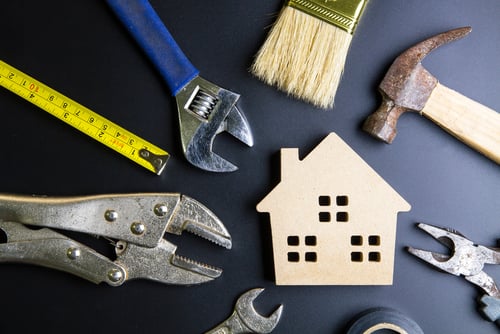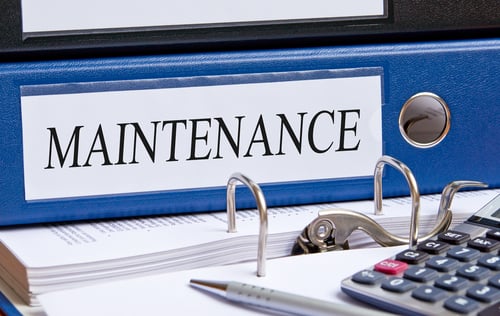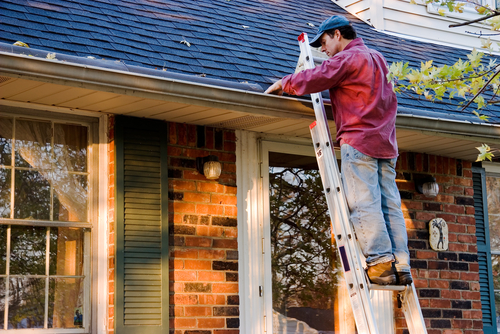
Property managers wear many hats throughout completing daily tasks. Property owners may not realize just how much property management and property maintenance go hand in hand. However, arguably a property manager’s most important role is to coordinate and complete necessary maintenance to the home. In addition, rental maintenance is directly linked to tenant satisfaction and retention along with the preservation of an owner’s valuable investment. So, how can property managers ensure efficient processing of maintenance needs? Continue reading below as we examine best practices for managing rental maintenance.
What is Managing Rental Maintenance So Important?
A well-maintained rental property has fewer emergency breakdowns and a better chance of retaining satisfied tenants. However, those are not the only reasons why effectively managing rental maintenance is essential. For example, demonstrating that owners care about how the home’s condition helps attract quality tenants who, in turn, will also care for the unit. That said, let’s review why property managers need to keep up with routine rental maintenance below.
- Investment Value – Rentals face more wear and tear than a traditional home. That said, preserved the property through routine or timely maintenance helps it retain value.
- Favorable Renewal Rates – Maintenance is a leading cause of disputes between landlords and tenants. So, simply by taking care of the property, landlords can avoid dissatisfied or disgruntled tenants and lead to more positive renewal rates.
- Reduced Maintenance Costs – Believe it or not, effectively managing rental maintenance can actually lead to reduced annual costs. Performing preventive maintenance on significant systems helps prevent the risk of emergency repairs and expensive breakdowns.
- Less Turnover Time – Turnover is the process of getting a unit ready for a new tenant after the previous has vacated. When a unit is in poor repair, to begin with, the turnover process can take much longer. This adds to the vacancy time and can cause owners to lose valuable marketing time. However, if the property remains maintained throughout the lease, turnover is far more efficient.
Steps to Managing Rental Maintenance as a Property Manager
Property managers have a lot of responsibility, and days are often filled with phone calls, emails, follow-up, customer service, and coordination. While no one wants to think about unexpected repairs, they do happen. So, to manage all of the many tasks at hand, property managers must be organized, efficient, and proactive.
 Check out the essential steps for managing rental maintenance below.
Check out the essential steps for managing rental maintenance below.
- Know Your Responsibilities
- Schedule Inspections
- Plan for Routine Maintenance
- Promptly Respond to Repair Requests
- Track and Mitigate Expenses
- Utilize Available Technology
Know Your Responsibilities
Being a successful property manager includes knowing the laws and guidelines that apply to rentals in your area. After all, this knowledge is a big selling point for owners who do not have the time or desire to keep up with changing regulations themselves. In general, a rental must maintain specific standards of habitability to operate legally. Therefore, as a property manager, it is vital to communicate these needs to the owner and ensure legal compliance at all times.
 Schedule Inspections
Schedule Inspections
During the course of the lease, several inspections are necessary. Typically, property managers perform inspections to check on the property condition, address any unreported repair needs, and perform routine maintenance. In addition, move-in and move-out inspections allow property managers to determine tenant damage and potentially deduct from the deposit. When conducting an inspection, be sure to use a detailed checklist and take photos or videos to document the property condition further. Also, to schedule a semi-annual property check, be sure to give a minimum of 24 hours notice to the tenant as they have a right to be present for any inspection.
Plan for Routine Maintenance
Major systems like the HVAC, plumbing, or water heater equate to major bills if things go wrong. In addition to big-ticket items, routine maintenance can include seasonal tasks such as cleaning the gutters annually to prevent water damage. So, it is helpful when property managers take a proactive approach to rental maintenance. Since maintenance tasks can quickly become overwhelming the more properties you have, it helps to build a schedule and set up reminders in your calendar. Another great option if owners agree is to set up maintenance contracts with HVAC vendors. Thus, adding another layer of protection to ensure major systems stay operating at peak performance year-round.
Promptly Respond to Repair Requests
Repair requests can come at any moment throughout the day or night. Therefore, property managers must have processes in place to handle all sorts of requests 24/7. While some repairs do require immediate action, all requests must receive a timely response of some kind. As a property manager, managing rental maintenance relies on organization and strong relationships with various vendors. These relationships allow you to call on vetted and experienced vendors to handle any repair. Whether it is a burnt-out light fixture or a burst pipe, communication is critical. So, always keep tenants informed of your progress and anticipated actions along the way. Even if it takes a few days to complete more extensive repairs, tenants will appreciate knowing someone is working diligently on a solution.
 Track and Mitigate Expenses
Track and Mitigate Expenses
One role for property managers is to manage and mitigate expenses because excessive repairs can wreak havoc on an owner’s profits. So, the key here is efficiency and proactive measures. That said, some of the steps property managers can take include –
- Proactive Prevention – Staying on top of regular maintenance goes a long way to control costs and prevent more significant problems from occurring down the road. So, periodically conduct inspections to confirm lease compliance and address any unreported maintenance concerns.
- Foster Relationships – Building relationships is vital whether you have access to in-house maintenance or rely on qualified vendors. After all, as a property manager, these are the people you turn to in an hour of need.
- Tracking Expenses – For property owners, every dollar counts. That said, property managers should carefully track and verify all invoices and itemized repair orders. For larger repairs, getting multiple estimates can help owners make the most financially sound decision.
Utilize Available Technology
Technology has made so many property management tasks more efficient and organized, including managing rental maintenance. So, to be successful, leverage what technology provides to streamline everyday tasks such as –
- Submitting Maintenance Requests – Tenants’ ability to submit repair requests electronically is very convenient for all involved. For managers, this saves the manual time needed to enter requests and allows tenants to provide additional details such as photos quickly.
- Maintenance Tracking – Through property management software, managers can track and follow up on repair progress, assign tasks to various vendors, and view invoices or estimates.
- Improved Connectivity – Integrated management software allows managers to easily share documents, invoices, or messages with owners or tenants at the touch of a button.
- Automation – Mundane or repetitive tasks take up considerable time for property managers. However, technology can automate much of this, freeing up valuable time to focus on more pressing matters.
How to Improve Communication When Managing Rental Maintenance
In property management, as it is in any business, clear and consistent communication is a vital skill. Managers must be able to communicate with tenants and obtain crucial details that aid in responding to repairs. In addition, property managers serve as the go-between for owners and tenants, so keeping owners in the loop is critical. Nowadays, communication comes in various forms, including phone calls, texts, emails, faxes, or in-person interactions – and property managers must master them all. Check out a few suggestions below to help improve communication when managing rental maintenance and other tasks.

Communication Tips for Property Managers
- Be Flexible – Not everyone communicates the same way, and property managers need to stay flexible whenever possible. For example, some owners prefer email communications so they can respond when they have time, while tenants may prefer a quick text message. Typically, it is much more efficient to contact an individual using their preferred communication method.
- Practice Active Listening – Active listening is a vital skill for property managers dealing with stressed, frustrated, or concerned tenants. It involves asking questions to clarify details, repeating concerns, and expressing empathy. As a property manager, your job is to deescalate disputes, alleviate any fears, and keep all parties informed.
- Check Your Attitude – Whether communicating via phone, text, or email, a property manager’s tone is essential. While it is necessary to be professional and an expert in your field, relatability often is the best course of action when speaking to tenants. Often, tenants just want to know their concerns are heard and taken seriously. So, if a tenant reaches out in anger or frustration, property managers must remain calm and professional at all times.
- Stick to the Truth – On occasion, a property manager must deliver unpleasant news, and while it may seem easier to sugar coat things – the truth is always better. When difficult conversations arise, tact, honesty, and empathy are key. So, be straightforward with tenants and reassure them of the steps taken to remedy the situation as soon as possible.
A Growing and In-Demand Industry
As the rental industry grows, so does the demand for qualified and experienced property managers. Property management firms assist owners and tenants in several ways. Besides managing rental maintenance, property managers use their expertise to provide excellent customer service while helping owners maximize profits.
The dedicated rental managers at Bay Property Management Group understand the unique maintenance needs rental properties face. Our network of in-house maintenance techs and relationships with third-party vendors means we stand prepared to tackle any repair. With a focus on preventative measures, the managers at Bay Property Management Group help owners mitigate costs and keep their property looking its best. For more information on the benefits of full-service property management in your area, give us a call today.

 Schedule Inspections
Schedule Inspections Track and Mitigate Expenses
Track and Mitigate Expenses